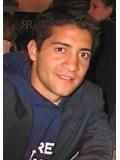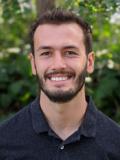People
Postdoctoral Fellow
Chris is a postdoctoral fellow in the Bearden Lab and the USC Lab of NeuroImaging. After earning a BA in Neuroscience and Philosophy from Pomona College, Chris worked with Dr. Michael Weiner at UCSF’s Center for Imaging of Neurodegenerative Diseases where he performed multimodal neuroimaging research on a wide range of neurodegenerative and psychiatric diseases. Chris currently works with Drs. Paul Thompson and Carrie Bearden on a number of projects through the Enhancing Neuro Imaging Genetics Through Meta Analysis Consortium (ENIGMA). With Dr. Bearden’s group, Chris is conducting a large-scale meta-analysis to characterize subcortical brain alterations in individuals with 22q11.2 Deletion and Duplication syndrome, the strongest known genetic risk factor for schizophrenia.
22q Study Coordinator
Leila Kushan-Wells is the study coordinator for the UCLA 22q11.2 Deletion Syndrome Study. She received her Bachelor’s degree in Neuroscience from UCLA and her Master’s degree in Neuroscience and Cognition from the University of Utrecht in Holland. She has worked as part of research teams investigating brain function in various patient populations. Leila is the main contact for participants and their families and she’d be happy to provide you with more information about our study.
Dr. Gil Hoftman recently joined the UCLA Child & Adolescent Psychiatry Division as a Health Sciences Clinical Instructor. He also joined the NIMH T32 Neurobehavioral Genetics Postdoctoral Fellowship Program directed by Nelson Freimer and under the primary mentorship of Carrie Bearden. His goal is to become an independent investigator leading an innovative and prolific research program studying the molecular mechanisms underlying cognitive dysfunction in schizophrenia, with an emphasis on understanding the cell and circuit specific developmental trajectories of these key molecular components. The underlying motivation for studying the development and dysfunction of cognitive control in schizophrenia is to improve patients’ lives by identifying biologically informed, innovative approaches to treat cognitive dysfunction in schizophrenia and by ideally preventing or delaying the premorbid developmental lag in cognitive control and the onset of psychosis in people with schizophrenia. In particular, he is passionate about understanding complex brain disorders like schizophrenia by using integrative, complementary approaches. One strategy for understanding the pathophysiology of a multifaceted syndrome like schizophrenia is to study the normal development of affected brain circuitry central to the disorder. At UCLA, he plans to pursue studies of both typical and pathological neurodevelopment by leveraging novel, integrative neurobehavioral genetics and neuroimaging approaches.
Charlie is an MD/PhD student in the UCLA Neuroscience Interdepartmental Graduate Program. After graduating with a BS in Psychology from Yale, he worked with Dr. Alan Anticevic in Yale’s division of Neurocognition Neurocomputation and Neurogenetics using multimodal neuroimaging to research the effects of psychiatric disorders and psychotropic drugs. In Dr. Bearden’s lab, Charlie is interested in leveraging brain imaging and genetic approaches to investigate the biological mechanisms underlying the development of psychosis spectrum disorders in individuals with genetic and clinical risk factors.
Sarah is a PhD student in the UCLA Neuroscience Interdepartmental Program. Prior to graduate school, she worked with Dr. Leanne Williams at Stanford University on large-scale neural circuits and interventions for adults with depression. In the Bearden Lab, she is currently interested in multimodal neural trajectories and their relationship with symptomology and functional outcomes in adolescents at clinical high risk for psychosis.
Carolyn is a PhD student in the UCLA Neuroscience Interdepartmental Program. Before coming to UCLA, she studied Psychological and Brain Sciences at Boston University. Upon graduation, Carolyn went on to complete a two-year fellowship at the National Institutes of Health with Dr. Lauren Atlas where she studied neural and psychological mechanisms of pain, medication, and expectancy. In Dr. Bearden's laboratory, Carolyn is interested in using brain imaging, behavior, immunology, and genetics approaches to study substance use and psychiatric disorders.
Kathleen is a PhD student in the Neuroscience Interdepartmental program. After graduating with a BS in Cognitive and Behavioral Neuroscience at Villanova University, she joined the Computational Psychiatry, Neuroimaging, and Sleep lab at Stanford School of Medicine. At Stanford, she worked with Dr. Andrea Goldstein-Piekarski to study the role of sleep in the maintenance and treatment of neuropsychiatric symptoms. In the Bearden lab, Kathleen studies the relationship between sleep and developmental psychiatric disorders using neuroimaging and genomic approaches.








